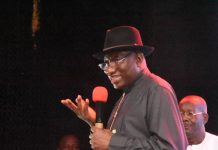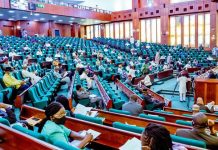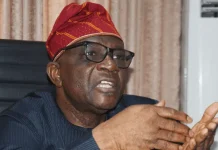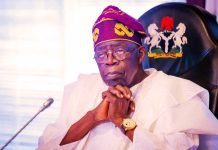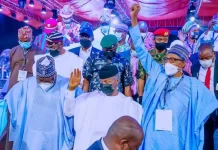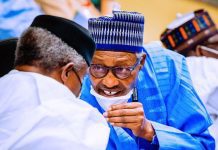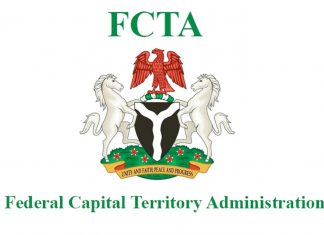The Supreme Court will begin deliberations on a case brought by sixteen state governments contesting the validity of the legislation creating the Economic and Financial Crimes Commission (EFCC) and two other anti-graft statutes in a few days, precisely on October 22, ceteris paribus. Out of the 16, two states—Ogun and Nasarawa—whose suits mostly revolve around the Nigerian Financial Intelligence Unit (NFIU) guidelines were given permission by the Supreme Court to be consolidated.
It has been twenty years since the EFCC Act went into effect in 2004. The commission was swiftly formed in 2003 in response to pressure from the Financial Action Task Force (FATF) on money laundering, which at the time clearly identified Nigeria as one of the 23 nations impeding international efforts to combat both domestic and cross-border money laundering.
Over the past 20 years, a number of attorneys have expressed concern about the EFCC Bill’s passage into law in a variety of places. They have pointed out that the Act’s quick change from a bill to an Act bypassed a crucial clause in the 1999 Nigerian Constitution (as amended).
The National Assembly passed an Act establishing the EFCC during President Olusegun Obasanjo’s presidency. Its primary focus was supposed to be on financial and economic crimes in the public and private spheres. The committee was subsequently seen as a brilliant move to combat corruption in the nation, which was then among the most corrupt in the world.
The commission received the funding it needed to get off the ground and operate from the then-vice president, Atiku Abubakar. To this day, he makes reference to this gesture. To put it simply, the EFCC was founded but did not receive the funding required to start up. That is all history now.
Read Also: One killed, another injured in Kwara community invasion
Nonetheless, the commission has been primarily seen as a persecuting tool rather than a prosecutorial one, at the hands of any president in power, nearly two decades after it started operating.
Supporters of this school of thought cite Nigeria’s positions both before and after the EFCC was established in the global corruption index. Actually, not much has changed. Nigeria continues to be one of the most corrupt countries in the world, ranking 145th out of 180 in the most recent survey.
Some further contend that the EFCC has been shielding overtly corrupt individuals by declining to prosecute them—people who are typically politically exposed—instead of fighting and taming corruption. They contend that the EFCC only has an unusual zest for prosecuting people who oppose any sitting president politically or who have opinions that differ from his or hers. They label the EFCC a persecuting organization as a result.
However, the state governments’ current complaint before the Supreme Court is not about this. As an act of the National Assembly and a federal legislation with jurisdiction over the states, they are challenging the validity of the EFCC.
The states were added as co-plaintiffs to the initial lawsuit brought by the Kogi State Government through its Attorney General (AG), and permission was granted to consolidate the cases. As a result, a seven-member panel chaired by Justice Uwani Abba-Aji has already set October 22 for the suit’s hearing.
The following states joined the suit: Ondo, Edo, Oyo, Kebbi, Katsina, Sokoto, Jigawa, Enugu, Benue, Anambra, Plateau, Cross-River, Niger. The suit is designated SC/CV/178/2023. The Nigerian Financial Intelligence Unit (NFIU) Financial Guidelines are being contested by Ogun and Nasarawa. A comprehensive examination of the states (Plaintiffs) revealed a broad range of diversity spanning the six geopolitical zones as well as various political parties. This demonstrates that the issue at hand is neither political nor deeply ingrained in partisan politics. It only concerns the validity, constitutionality, and appropriateness of the Act that established the commission.
They contend that the states’ rights and powers as federating entities within a federation were undermined by the passage of the EFCC Act. They argue that although they have functioning Houses of Assembly as states, the 1999 Constitution (as amended) did not require these Houses of Assembly to be consulted during the enactment of the EFCC Act.
They have therefore petitioned the Supreme Court to explain why, in accordance with the Constitution, the State Assemblies’ view was not solicited.
The state governments point to the case of Dr. Joseph Nwobike v. Federal Republic of Nigeria, in which the Supreme Court ruled that the National Assembly had enacted the EFCC Establishment Act based on a UN Convention Against Corruption (UNCAC) and that the Federal lawmakers had arbitrarily disregarded Section 12 of the 1999 Constitution, as amended, when passing this law in 2003.
Read Also: Ex-Deputy Governors of Nigeria alarmed over increasing hardship, insecurity
The state governments said that Section 12’s requirements must be followed in order for a Convention to become Nigerian law. The state governments claim that before the EFCC Act or any other similar law is passed, the Houses of Assembly of the majority of the states must concur to introduce the UN Convention to Nigeria in accordance with the provisions of the Constitution. They contend that neither the constitutional process nor this crucial prerequisite, which upholds Nigeria’s sovereignty as an independent state, were ever fulfilled.
This is the wording of the Constitution. “The National Assembly may make laws for the Federation or any part thereof with respect to matters not included in the Exclusive Legislative List for the purpose of implementing a treaty,” according to Section 12, Subsection (2) of the 1999 Constitution (as amended). Nigeria adopted the UNCAC treaty on December 14, 2004, which served as the basis for the EFCC. Because of this treaty, the EFCC Act was passed by the National Assembly and the Executive Branch without the support of the State Assemblies.
A bill of the National Assembly passed in accordance with subsection (2) of the section “shall not be presented to the President for assent, and shall not be enacted, unless it is ratified by a majority of all the Houses of Assembly in the Federation,” according to subsection three(3) of section 12. This is the main point of contention. Should the Houses of Assembly of the majority of the states have concurrently ratified the EFCC and other measures before they were incorporated into an Act of Parliament? In the upcoming days, the astute Justices of the Supreme Court will be rendering a decision on this complex matter.
At a judicial dinner, a distinguished British jurist and one of the most important justices in legal history, Lord Denning, made fun of a fellow colleague by saying, “Unlike my brother judge here, who is concerned with law, I am concerned with justice.” It is justice, not judgment, that the state governments demand. They are uttering the time-honored dictum, “Let justice be done, though the heavens fall” (Fiat justitia ruat caelum in Latin), which served as the impetus for the changes that have taken place in contemporary legal practice. There is a mournful call for justice in the atmosphere. In this case, may the Supreme Court deliver justice rather than condemnation.
Join Television Nigerian Whatsapp Now
Join Television Nigerian Facebook Now
Join Television Nigerian Twitter Now
Join Television Nigerian YouTUbe Now

